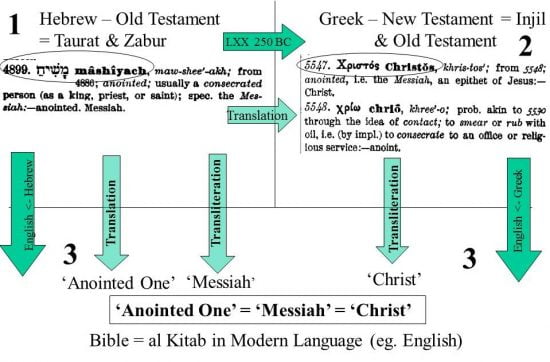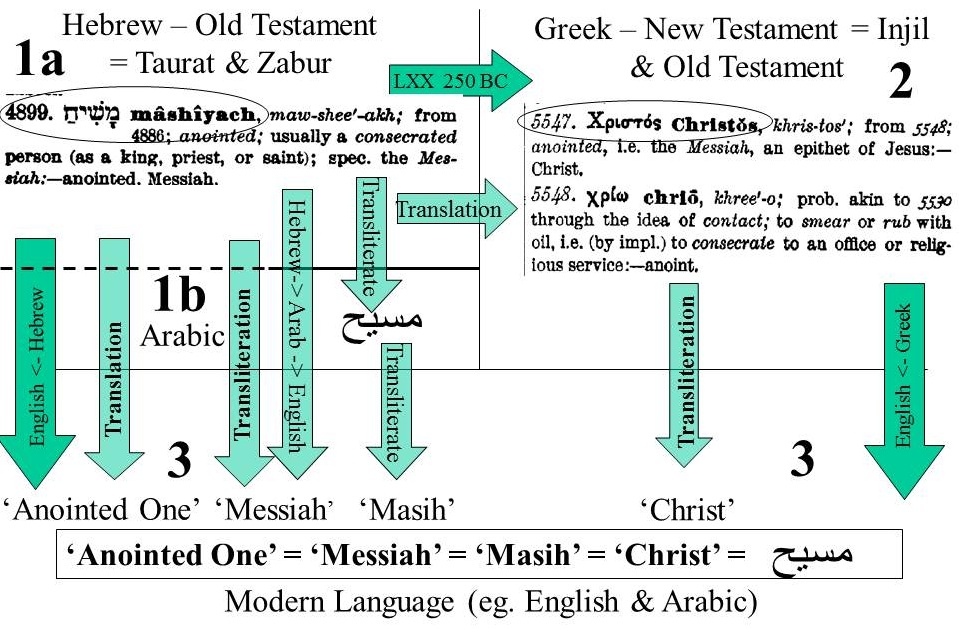The Qur’an refers to Isa (Jesus – PBUH) as ‘al Masih’. What does this mean? Where does it come from? Why do Christians refer to him as ‘the Christ’? Is ‘Masih’ the same as ‘Christ’ or is this some contradiction or corruption? The Zabur (Psalms) provides the answers to these important questions. However, to understand this article you need to first read the article on ‘How was the Bible translated?’.
The Origin of ‘Christ’
I follow the translation process as explained, focusing on the word ‘Christ’ used in the modern-day Injil or New Testament. See below for a visual representation.

You can see that in the original Hebrew of the Zabur (in Quadrant #1) the term was ‘mashiyach’ which the Hebrew dictionary defines as an ‘anointed or consecrated’ person. Certain passages of the Zabur (Psalms) spoke of a specific mashiyach who was prophesied to come. When the Septuagint was developed in 250 BC, the scholars used a word in Greek for the Hebrew mashiyach that had a similar meaning – Χριστός = Christos. The word came from chrio, which meant to rub ceremonially with oil. This is also the source of words like christening.
Therefore the word Christos was translated by meaning (and not transliterated by sound) from the Hebrew ‘mashiyach’ into the Greek Septuagint to refer to this specific person. This is Quadrant #2. The disciples of Isa (Jesus – PBUH) understood that he was this very person that was spoken of in the Septuagint. Therefore, they continued to use the term Christos in the Injil (or New Testament). (again in Quadrant #2)
What about other languages?
But with modern-day English (or other languages) ‘Christos’ was then transliterated from the Greek into English (and other modern languages) as ‘Christ’. This is the lower half of the figure labelled #3. Thus the English ‘Christ’ is a very specific title from Psalms of Zabur, derived by translation from Hebrew to Greek, and then transliteration from Greek to English. The Hebrew Zabur is translated directly to modern languages and translators have used different words in rendering the original Hebrew ‘mashiyach’.
Some (like King James) transliterated the Hebrew ‘mashiyach’ to the English word Messiah by sound. Others (like New International) translated ‘mashiyach’ by its meaning and so have ‘Anointed One’ in these specific passages of the Psalms (or Zabur). In either case, we do not often see the word ‘Christ’ in the English Psalms and therefore this connection to the Old Testament is not obvious. But from this analysis, we know that in the Bible (or al kitab), ‘Christ’=’Messiah’=’Anointed One’, and that it was a specific title.
So where does ‘Masih’ come from in Qur’an?
We have seen how ‘Christ’=’Messiah’=’Anointed One’ which are equivalent titles that you find in different parts of the Bible (al kitab). But what about how ‘Christ’ is referred to in Qur’an? To answer I will extrapolate from the figure above which showed the flow of Mashiyach->Christ in the Bible (al kitab).
The figure below expands the process to include the Arabic Qur’an which was written after the Hebrew and Greek translations of the Bible (al kitab). You can see that I have divided quadrant #1 into two parts. Part 1a is the same as before dealing with the original ‘mashiyach’ in Hebrew Zabur as explained above. Part 1b now follows this term into Arabic. You can see that the term ‘mashiyach’ was transliterated (i.e. by a similar sound) in the Qur’an (as مسيح). Then, when Arabic-speaking readers of the Qur’an rendered the word into English they again transliterated it as ‘Masih’.

With this background knowledge we can see that they are all the same title and all mean the same thing in the same way “4= ‘four’ (English) = ‘quatre’ (French) = IV (Roman numbers) = 6-2 = 2+2.
The Christ anticipated in the first century
With this knowledge, let’s make some observations from the Gospel (the Injil). Below is the reaction of King Herod when the wise men from the East came looking for the king of the Jews, a well-known part of the story of the birth of Isa (Jesus – PBUH). Notice, ‘the’ precedes Christ, even though it is not referring specifically to Isa (Jesus – PBUH).
When King Herod heard this he was disturbed, and all Jerusalem with him. When he had called together all the people’s chief priests and teachers of the law, he asked them where the Christ was to be born. (Matthew 2:3-4)
You can see that the very idea of ‘the Christ’ was already commonly accepted between Herod and his religious advisors – even before Isa (Jesus – PBUH) was born – and it is used here without referring specifically to him. This is because, as explained above, ‘Christ’ comes from the Zabur (Psalms) written hundreds of years earlier by Prophet and King Dawud (David – PBUH), and it was commonly read by Jews of the 1st century (like Herod) in the Greek Septuagint. ‘Christ’ was (and still is) a title, not a name. From this we can dismiss right away the ridiculous notions that ‘Christ’ was a Christian invention or an invention by someone like the Roman Emperor Constantine of 300 AD popularized by movies like Da Vinci Code. The title was in existence hundreds of years before there were any Christians or before Constantine came to power.
Prophecies of ‘The Christ’ in Zabur
Let’s look at these first occurrences of the prophetic title ‘Christ’ in Zabur (the Psalms), written by Prophet Dawood (David – PBUH) ca 1000 BC – far, far before the birth of Isa (Jesus – PBUH).
The kings of the earth take their stand … against the LORD and against his Anointed One … The One enthroned in heaven laughs; the Lord scoffs at them… saying, “I have installed my King on Zion, my holy hill….”.
(Psalm 2:2-4)
Psalm 2 of Zabur in the Septuagint would read in the following way in the Greek Septuagint (I am putting it with a transliterated Christos so you can ‘see’ the Christ title like a reader of the Septuagint could)
The kings of the earth take their stand … against the LORD and against his Christ … The One enthroned in heaven laughs; the Lord scoffs at them… saying, “I have installed my King on Zion, my holy hill …
(Psalm 2)
You can now ‘see’ Christ in this passage like a reader of the 1st century would have. And the following transliteration would have exactly the same meaning:
The kings of the earth take their stand … against the LORD and against his Masih … The One enthroned in heaven laughs; the Lord scoffs at them… saying, “I have installed my King on Zion, my holy hill …
(Psalm 2 of Zabur)
Side-by-side comparison
But the Zabur (Psalms) continue with more references to this coming of Christ or Masih. I put the standard passage side-by-side with a transliterated one with ‘Christ’ and with ‘Masih’ so you can see it.
| Psalm 132- From Hebrew | Psalm 132 – From Septuagint | Psalm 132 of Zabur with Arabic transliteration |
| O Lord, …10 For the sake of David your servant, do not reject your anointed one.11 The Lord swore an oath to David, a sure oath that he will not revoke: “One of your own descendants I will place on your throne— …17 “Here I will make a horn grow for David and set up a lamp for my anointed one. ” | O Lord, …10 For the sake of David your servant, do not reject your Christ.11 The Lord swore an oath to David, a sure oath that he will not revoke: “One of your own descendants I will place on your throne— …17 “Here I will make a horn grow for David and set up a lamp for my Christ. ” | O Lord, … For the sake of Dawud your servant, do not reject your Masih.11 The Lord swore an oath to Dawud, a sure oath that he will not revoke: “One of your own descendants I will place on your throne— …17 “Here I will make a horn grow for Dawud and set up a lamp for my Masih. ” |
What can we learn from this?
You can see that Psalm 132 specifically speaks in the future tense (“…I will make a horn for David (or Dawud)…”), like so many passages throughout the Taurat and Zabur. This is important to remember when assessing the prophecies. It is clear that the Zabur makes future-looking claims and predictions – and this is without considering the Injil. Herod was aware that the Old Testament prophets made predictions about the coming ‘Christ’ – which was why he was ready for this announcement.
He just needed his advisers to explain the specifics of these predictions because he did not know the Zabur very well. The Jews are known to be waiting for their Messiah (or Christ). The fact that they are waiting or looking for the coming of their Messiah has nothing to do with Isa (or Jesus – PBUH) in the Injil or New Testament (since they ignore that) but rather has everything to do with the explicitly future-looking prophecies in the Zabur.
The prophecies of Taurat & Zabur: like a lock of a lock-and-key system
The fact that the Taurat and Zabur specifically predict the future makes them like the lock of a door. A lock is designed in a certain shape so that only a specific ‘key’ that matches the shape can unlock it. In the same way the Old Testament is like a lock. We saw already in the posts on the Great Sacrifice of Ibrahim (PBUH), the Passover of the Prophet Musa (PBUH) and the coming Sign of the Virgin’s Son (please review if they are not familiar) that there were specific prophecies of this coming person.
Psalm 132 of Zabur adds the rule that ‘the Christ’ would be from the line of Prophet and King Dawud (=David – PBUH). So the ‘lock’ becomes more and more precise as we read the prophetic passages through the Old Testament. The Zabur does not end with these prophecies. It tells us in much further detail what the Masih would be and do. We continue through the Zabur.
One point:
The Arabic word مسیح is, I believe, not a transliteration of the Hebrew. If it were, would not the final letter be a خ (kh) rather than a ح (h)?
My Arabic dictionary derives it from the root مَسَحَ (masaha) – to wipe, stroke, comb, wash (with water), anoint etc. مسیح , my dictionary says, means smooth, anointed, Messiah, … and great traveller.
Most of our friends do masah during their wudhu (washing) before salaat (prayers). This is the wiping of water onto the head, neck and ears. I’ve just come across this demonstration on YouTube http://www.youtube.com/watch?v=4DmoChMnnwg. Masah starts at 4.30 and ends at 7.45.
Just as in wudhu masah, performed on oneself with water, is a preparation for salaat, so in the Bible masah, performed by another with oil, is preparation for prophethood, priesthood or kingship. Al-Masih (THE One wiped with oil) is the one who has been supremely prepared for all three roles.
Many of our friends don’t know why the word Masih is applied to ‘Isa. We have the wonderful privilege of explaining it.
May Almighty Allah remind our friends 5 times a day of the One who was given the highest masah.